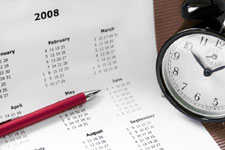Minute Taking
 Minutes are a factual, impartial and balanced record of the decisions and summary of a meeting. As such they should be an accurate, brief and clear snapshot of what was discussed, what was agreed, and what action is to be taken, by whom and by when. Unfortunately, many meeting minutes end up inaccurate, long and confusing, so people rarely want to read them, much less pick up any actions they are responsible for! So here are the top 10 tips for minute takers:
Minutes are a factual, impartial and balanced record of the decisions and summary of a meeting. As such they should be an accurate, brief and clear snapshot of what was discussed, what was agreed, and what action is to be taken, by whom and by when. Unfortunately, many meeting minutes end up inaccurate, long and confusing, so people rarely want to read them, much less pick up any actions they are responsible for! So here are the top 10 tips for minute takers:


 A vital step when approaching trial
A vital step when approaching trial .jpg) Attitude is a mind-set. It is the way you look at things mentally. When things are going well a positive attitude is easy to maintain. But we're all human and something will always happen to test our positive mind-set. So when that happens, here are the top 10 tips to help you bounce back and regain a positive outlook:
Attitude is a mind-set. It is the way you look at things mentally. When things are going well a positive attitude is easy to maintain. But we're all human and something will always happen to test our positive mind-set. So when that happens, here are the top 10 tips to help you bounce back and regain a positive outlook: In the last two issues we have looked at preparing and writing a report. The third and final stage of report writing is to check your report. Make sure you are methodical when checking, no matter how much you feel you know what you have written: start at the top of page one, and keep going until the last line of the last page!
In the last two issues we have looked at preparing and writing a report. The third and final stage of report writing is to check your report. Make sure you are methodical when checking, no matter how much you feel you know what you have written: start at the top of page one, and keep going until the last line of the last page!.jpg) We are unlikely ever to have sufficient time to do all the things we want or need to do. Therefore, it’s vital to make the best use of the time we have available. And since time itself is not physically manageable, we have to learn to manage ourselves, our workloads, our priorities and our clutter. Here are top ten tips to help you do this:
We are unlikely ever to have sufficient time to do all the things we want or need to do. Therefore, it’s vital to make the best use of the time we have available. And since time itself is not physically manageable, we have to learn to manage ourselves, our workloads, our priorities and our clutter. Here are top ten tips to help you do this: In the last issue we looked at preparing to write a report. If you have been following all the tips in that issue, you are now ready to write your report! To write well, use plain English and adopt the ABC's of writing: be accurate, be brief and be clear. There is no point investing time and effort in your report only to have your readers lay it aside or ignore it because they find it full of jargon, difficult to read or badly laid out. So here are top ten tips for writing a report:
In the last issue we looked at preparing to write a report. If you have been following all the tips in that issue, you are now ready to write your report! To write well, use plain English and adopt the ABC's of writing: be accurate, be brief and be clear. There is no point investing time and effort in your report only to have your readers lay it aside or ignore it because they find it full of jargon, difficult to read or badly laid out. So here are top ten tips for writing a report: The phone is constantly engaged. The taxi ignores you. Your train is late. Why do minor hassles like these have the potential to make us uptight? Maybe it's because we're tightly wound already and can't find the pressure relief valve. We all live and work in a pressured world - pressure over money, commuting, technology, looking good, eating well. Balancing the pressures of home life and work life are vital if we are to get optimum amounts of the adrenaline buzz to stay healthy and enjoy the whole life! So here are the top ten tips for when the going gets tough:
The phone is constantly engaged. The taxi ignores you. Your train is late. Why do minor hassles like these have the potential to make us uptight? Maybe it's because we're tightly wound already and can't find the pressure relief valve. We all live and work in a pressured world - pressure over money, commuting, technology, looking good, eating well. Balancing the pressures of home life and work life are vital if we are to get optimum amounts of the adrenaline buzz to stay healthy and enjoy the whole life! So here are the top ten tips for when the going gets tough: reactions and behaviours we employ now are the result of years of fine tuning. Being assertive doesn’t happen overnight, but the more practice you get, the more skilled you become. And while you may not always get what you want, you will always know you gave it your best. So here are the top ten tips for improving your assertive behaviour:
reactions and behaviours we employ now are the result of years of fine tuning. Being assertive doesn’t happen overnight, but the more practice you get, the more skilled you become. And while you may not always get what you want, you will always know you gave it your best. So here are the top ten tips for improving your assertive behaviour: In order to use valuable time effectively during a meeting it is crucial that you have a well-prepared agenda. An agenda helps the chairperson to stick to time and lead the meeting successfully. It also helps participants to prepare as they can see when they will be involved. Finally, it is of great benefit to the minute taker as they can see what will be discussed, the aim of each item and the priority given to it.
In order to use valuable time effectively during a meeting it is crucial that you have a well-prepared agenda. An agenda helps the chairperson to stick to time and lead the meeting successfully. It also helps participants to prepare as they can see when they will be involved. Finally, it is of great benefit to the minute taker as they can see what will be discussed, the aim of each item and the priority given to it. great resolutions and to not break them for once. It always seems to happen, you come up with a great list:
great resolutions and to not break them for once. It always seems to happen, you come up with a great list: